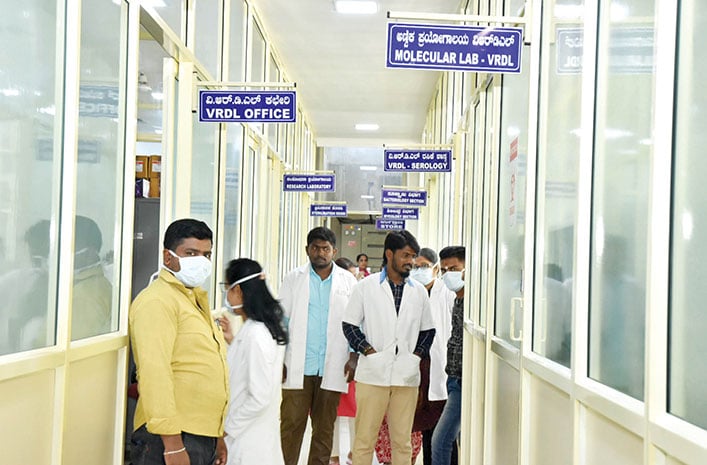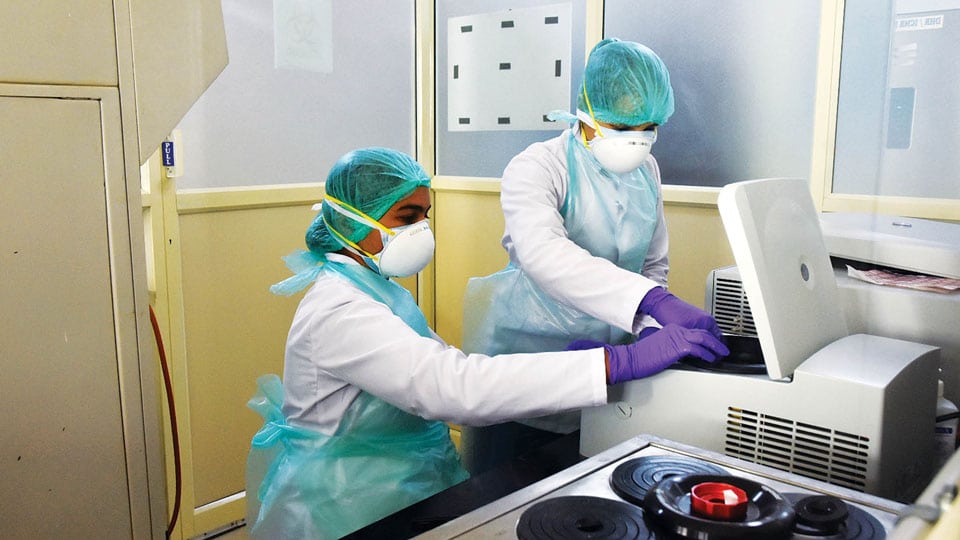Viral Research and Diagnostic Laboratory located at Microbiology Wing
Mysore/Mysuru: Over 78 people in India have tested positive for Novel Coronavirus or COVID-19. As of now, it is only Government and Government-authorised Diagnostic Laboratories that are testing for Coronavirus infection.
An important point to remember here is that none of the Private Diagnostic Labs are equipped to test for COVID-19. In Mysuru city, the state-of-the-art Viral Research and Diagnostic Laboratory (VRDL) at the Department of Microbiology in Mysore Medical College and Research Institute (K.R. Hospital) has been authorised to test COVID-19 samples.
The VRDL is an integral part of the Medical College. It is a centralised laboratory where all the COVID-19 cases in the region will be tested and the reports will be sent to National Institute of Virology (NIV), Pune, that will act as the apex laboratory to certify the disease if it is positive or negative.
Sole authorised agency
Speaking to Star of Mysore this morning, Dr. Rajesh, Resident Medical Officer of K.R. Hospital, said that the samples of suspected cases can be sent to the Lab for analysis and it would take about three hours to get the results. “The VRDL is equipped to conduct the tests but the authority of confirming the COVID -19 virus lies solely with the NIV in Pune that is governed by Indian Council of Medical Research (ICMR). In Mysuru, VRDL is also the sole agency for collection and transportation of suspected samples of COVID-19 to NIV,” he said.
The VRDL helps cover a particular region for timely diagnosis and identification of viruses during outbreaks of epidemics, generation of data about viral diseases for facilitating quick deployment of adequate resources and measures to save the human lives during outbreaks.

Annual epidemics
Apart from annual epidemics like Dengue, Chikungunya, Influenza, Rotavirus, Measles-Rubella, Japanese Encephalitis etc., there are acute outbreaks or threats of infiltration of new or exotic viruses such as Nipah virus (2001, 2007, 2018), SARS-CoV (2003), Avian Influenza H5N1 (2006), ECSA strain of Chikungunya (2006), Pandemic Influenza (2009), Ebola virus (2013), Zika virus (2016), Yellow fever virus and MERS-CoV (Middle East Respiratory Syndrome-coronavirus), which pose a serious threat to the country.
In such a situation, a network of VRDLs across the country, established by the Department of Health Research, Government of India, is proving a boon to check the rise in the number of viral outbreaks and the resultant mortality.
VRDL networks
Established at a cost of Rs. 1.3 crore in Mysuru, the VRDL creates infrastructure for timely identification of viruses and other agents causing epidemics, develops capacity for identification of novel and unknown viruses and other organisms and identifies emerging and re-emerging viral strains and develop diagnostic kits. It also provides training to health professionals and undertakes research for identification of emerging and newer genetically active or modified agents.
Since 2014, across India, a network of VRDLs was established. The network has 10 Regional Laboratories, 30 State-level Laboratories and 120 Medical College Laboratories like the one in Mysore Medical College.








Recent Comments